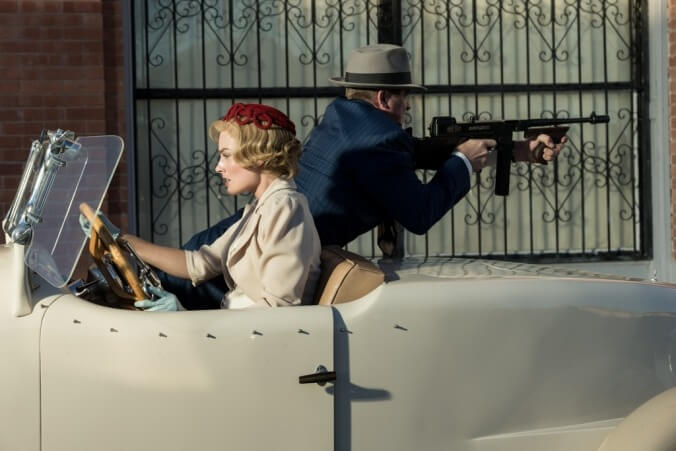Margot Robbie makes a captivating outlaw in the Dust Bowl thriller Dreamland

Note: The writer of this review watched Dreamland on a digital screener from home. Before making the decision to see it—or any other film—in a movie theater, please consider the health risks involved. Here’s an interview on the matter with scientific experts.
“What if John Steinbeck wrote about gangsters?” seems like a hypothetical thought experiment that would come out of a particularly blissed-out hang with humanities nerds. It also essentially describes the vibe of Dreamland. Beautifully shot to communicate the almost otherworldly loneliness of Texas during the Dust Bowl era, Miles Joris-Peyrafitte’s film combines various emblems of Americana—an abandoned son, a struggling family farm, a gun moll, the dream of escaping a small town—into a familiar but effectively engrossing thriller. The film makes the most of its sparseness, using the strong performances of its ensemble cast (including a reliably excellent Margot Robbie) to question the accepted boundaries between right and wrong, citizen and outlaw.
Between the widespread devastation of the Dust Bowl storms and accompanying drought, and a steady rhythm of violent spats between gangsters and the police, 1935 was a bloody year in America. Teenager Eugene Evans (Finn Cole) lives with his mother Olivia (Kerry Condon), stepfather George (Travis Fimmel), and younger half-sister Phoebe (Darby Camp) on a struggling family farm in water-starved Texas. His biological father left when he was 5 years old, and Eugene has never gotten over that absence, as an adult Phoebe (voiced by Lola Kirke) explains through voiceover. So Eugene fills his days with fantasies of finding his father, who wrote him once about the beauty of the Gulf Of Mexico, and spends hours reading gangster comics in the family’s abandoned barn. It transforms into his refuge, full of the stories he wished he was living.
Eugene gets his chance at a different life when bank robber Allison Wells (Margot Robbie), fleeing from a shootout with the cops that leaves a 9-year-old girl and a half-dozen adults dead, crash-lands into town. At first, Eugene’s pursuit of Allison is sparked entirely by the $10,000 reward being offered for her capture. But when their paths cross and she insists on her innocence, their relationship starts to mirror some of the very adventure stories Eugene turns to so often for an escape. Screenwriter Nicolaas Zwart gets meta with his exploration of gangster mythology, allowing Allison to tinker with her own reputation and toy with Eugene’s lively imagination. But in their shared desire to flee their lives, Dreamland finds something less self-conscious, more melancholy and measured. There’s an aching quality to the ending; what it says about the limits of reinvention recalls the themes of labor, legacy, and identity that Steinbeck explored in novels like The Grapes Of Wrath and East Of Eden.
Steady and soothing, Kirke’s vocal performance gives the story immediate heft—the weight of a yarn passed down from generation to generation—and also serves as a shortcut to emotional interiority for these characters. Cole’s performance needs it; his Eugene is slightly under-sketched, leaping into rash decisions without quite enough identifiable motivation. The actor’s best in the film’s quieter moments, in scenes that rely on a pent-up physicality: staring frozen at yet another positively apocalyptic dust storm, before snapping into movement and slamming a door shut against it, or anxiously twisting his fingers together as he questions Allison about the feelings they have for each other. Cole isn’t particularly emotive—and his American accent is fairly spotty—but his low-key work allows Robbie to shine, as she always does.
Caught somewhere between the spirited freneticism of Robbie’s Harley Quinn and the private fragility of her Sharon Tate, Allison is varyingly unapologetic and repentant, manipulative and sincere. (“I’m the man in the hat,” she says by way of introduction when she sees all of Eugene’s comics.) The film’s final minutes, when Allison’s behavior becomes spontaneous, demand a fair amount from Robbie. But the character is so well-formed by that point that every choice makes sense in the second it’s made; it’s only a moment or so afterward, when Allison catches her breath, that she realizes the shattering impact of what she’s done—and that pattern works throughout Dreamland, which builds in little moments of quiet to remind us of the human cost of all these dreams.
Cinematographer Lyle Vincent (A Girl Walks Home Alone At Night, Thoroughbreds, Daniel Isn’t Real) shows off another angle of his talent with a wide-eyed, sprawling style that’s Malickian in ambition. He contrasts the human despair of this corner of Texas with the beauty that can also be found there: a low-angle shot of the azure sky, uninterrupted and imposing; the creamy yellow of Allison’s car, speeding down a dirt road; the bleeding orange of a setting sun, silhouetting a search party canvassing the plain. Between Vincent’s cinematography and Robbie’s verve, Dreamland is a confident portrait of the restless, reckless striving of which American legends are made.